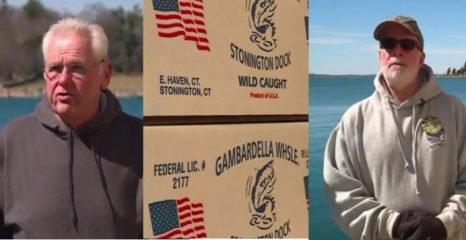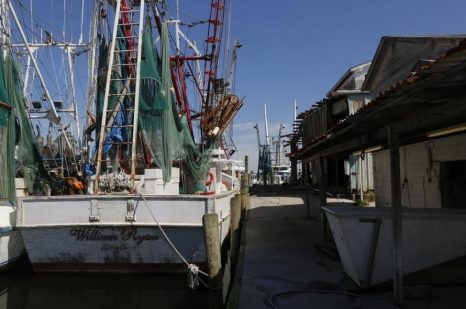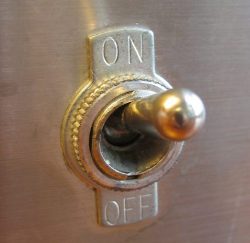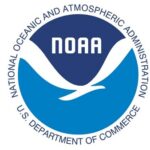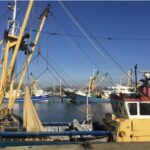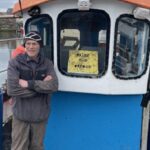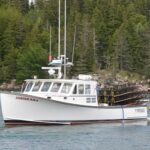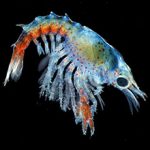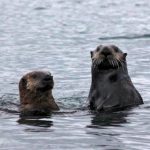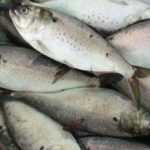Monthly Archives: March 2017
Plan to reopen Maine shrimp fishery in the works
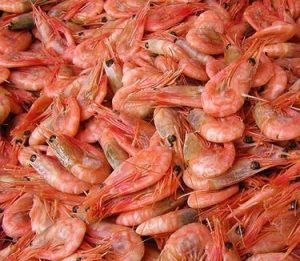 The Atlantic States Marine Fisheries Commission is seeking comment on its plan to reopen the northern shrimp fishery, which has been closed for three years. The Arlington, Va.-based regulatory agency’s plan includes options such as changing the way the quota system is managed. The agency noted that earlier proposals had considered establishing a limited entry program. The current proposal eliminates that option and focuses instead on “total allowable catch allocation programs, gear requirements, and other measures to improve management of the northern shrimp fishery and resource.” continue reading the story click here 21:14
The Atlantic States Marine Fisheries Commission is seeking comment on its plan to reopen the northern shrimp fishery, which has been closed for three years. The Arlington, Va.-based regulatory agency’s plan includes options such as changing the way the quota system is managed. The agency noted that earlier proposals had considered establishing a limited entry program. The current proposal eliminates that option and focuses instead on “total allowable catch allocation programs, gear requirements, and other measures to improve management of the northern shrimp fishery and resource.” continue reading the story click here 21:14
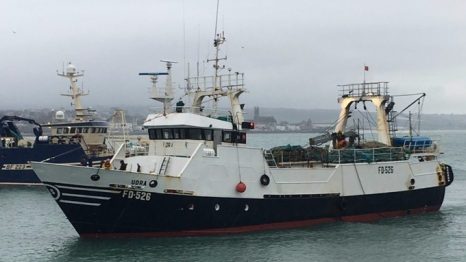
Are Spanish trawlers in Cornwall ‘getting landing figures up’ so they can claim link to UK during Brexit talks?
It could be just a coincidence but the arrival of what are understood to be Spanish trawlers in Cornwall has left some wondering if something fishy is going on. Within hours of the government triggering Article 50 the boats were landing their catch in the Cornish harbour of Newlyn for the first time in years. The suspicion amongst some in the fishing community is that these boats, which sail under a British Flag but are part of the Spanish fleet, are “getting the landing figures up so they can claim an economic link to the UK during Brexit talks”. read the rest, click here 18:09
FISH-NL: Shrimp cuts impact harvesters/rural communities like a hammer
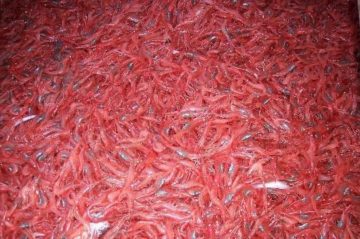 The Federation of Independent Sea Harvesters of Newfoundland and Labrador (FISH-NL) says the massive cut to the northern shrimp quota off the Great Northern Peninsula and southern Labrador (Shrimp Fishing Area 6) has hit the inshore fleet and adjacent communities like a hammer. “The crisis in the shrimp fishery is unprecedented,” says Ryan Cleary, President of FISH-NL. “The situation today is even worse than the groundfish moratoriam of the early 1990s in that many shrimp harvesters have no other species to turn to. The harvesters who do have other species have also taken massive hits.” Read the press release here 17:47
The Federation of Independent Sea Harvesters of Newfoundland and Labrador (FISH-NL) says the massive cut to the northern shrimp quota off the Great Northern Peninsula and southern Labrador (Shrimp Fishing Area 6) has hit the inshore fleet and adjacent communities like a hammer. “The crisis in the shrimp fishery is unprecedented,” says Ryan Cleary, President of FISH-NL. “The situation today is even worse than the groundfish moratoriam of the early 1990s in that many shrimp harvesters have no other species to turn to. The harvesters who do have other species have also taken massive hits.” Read the press release here 17:47
Cable Under Gardiner’s Bay Sparks Debate – Trustees, baymen talk wind farm landing sites
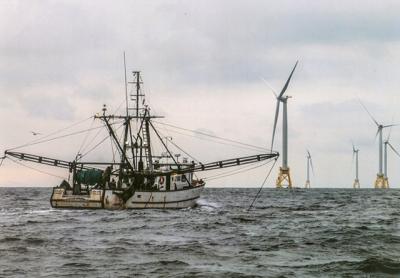 When officials of Deepwater Wind, the Rhode Island company that plans to construct an offshore wind farm 30 miles from Montauk, presented its plans to the community at Clinton Academy in East Hampton on March 9, several commercial fishermen in attendance voiced opposition, fearing a negative impact on their livelihood. That concern resurfaced on Monday night, when the East Hampton Town Trustees heard from several residents. Mr. (Gary) Cobb wondered “what jet-plowing is going to do to the bottom of Gardiner’s Bay.” The Air Force veteran, who studied avionics systems technology, also questioned “the proximity of these transmission lines to not just significant coastal wildlife habitat, but essential fish habitat.” continue reading the story here 17:13
When officials of Deepwater Wind, the Rhode Island company that plans to construct an offshore wind farm 30 miles from Montauk, presented its plans to the community at Clinton Academy in East Hampton on March 9, several commercial fishermen in attendance voiced opposition, fearing a negative impact on their livelihood. That concern resurfaced on Monday night, when the East Hampton Town Trustees heard from several residents. Mr. (Gary) Cobb wondered “what jet-plowing is going to do to the bottom of Gardiner’s Bay.” The Air Force veteran, who studied avionics systems technology, also questioned “the proximity of these transmission lines to not just significant coastal wildlife habitat, but essential fish habitat.” continue reading the story here 17:13
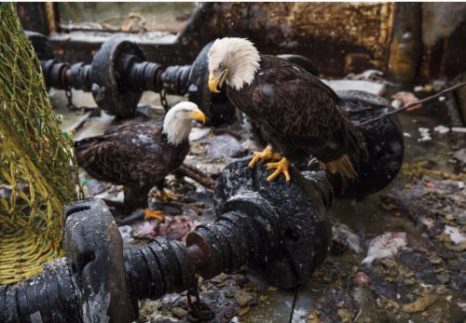
Dirty Birds – What it’s like to live with a national symbol
Dutch Harbor is a small town on a small island far out in Alaska’s Aleutian chain, nearly 1,200 miles from Anchorage at the edge of the Bering Sea. It’s the most productive fishing port in the United States. Every winter the tiny population swells with thousands of people who come to work in the fish processing plants, on the crab boats, or out on the big cod and pollack trawlers. But they’re not the only ones trying their fortunes in town or out on the boats. People in town call them Dutch Harbor pigeons. The rest of us call them bald eagles. In a community of just over 4,700 permanent residents, there live an estimated 500 to 800 eagles. They stare judgily down from light posts, peer intently into people’s windows, eat foxes and seagulls while perched in the trees next to the high school, and sit on rooflines like living weather vanes. Down at the docks, they swarm every boat that comes into port like some sort of Hitchcockian nightmare, fighting for scraps of bait, elbowing one another for prime positions, crowding together on top of crab pots, and squawk-cheeping their opinions. View more images, read the story here 11:01
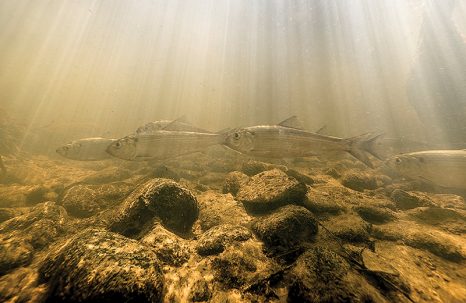
Sonar revealing more river herring in Choptank River than expected
Scientists have a powerful new tool to help them “see” fish in the Chesapeake Bay’s murky tributaries, and it’s yielding some surprisingly good news about two of the estuary’s most troubled species. “Imaging sonar” uses sound to help them view, and count, passing fish in dark or cloudy water. For the past few years, scientists with the Smithsonian Environmental Research Center have been deploying one of these underwater sound cameras in some of the Bay’s rivers to monitor spawning runs of alewife and blueback herring, collectively known as river herring.,,No one knows for sure how many river herring are in the Bay, as fisheries managers lack the staff and resources to do a comprehensive assessment. But a SERC-led team of scientists deployed an imaging sonar device in the Choptank River in 2014 that captured images of the fish as they swam by. Based on the rate at which scientists saw the shadowy blips cross their computer screens, they estimated that as many as 1.3 million river herring swam upriver that spring to spawn. That’s more than expected, and way more than state biologists had figured were there in the early 1970s, the last time anyone looked intensively at the Choptank’s herring runs. Read the article here 10:14
Rural NL faces devastation in light of drastic cuts to northern shrimp quota
 ST. JOHN’S – Yesterday evening, the federal government announced a 63 per cent cut to inshore northern shrimp quota in fishing area 6. The FFAW is calling on the federal Minister of Fisheries and Oceans to reconsider the radical nature of these cuts, and once again calls for the offshore to be removed from shrimp fishing area (SFA) 6. The total allowable catch for SFA 6 went from 48,196 tons in 2015 to 27,825 tons in 2016, to a dismal 10,400 tons announced for 2017. This amounts to a 78 per cent quota reduction over two years. The Department of Fisheries and Oceans (DFO) slashed harvest rates from 20 per cent in 2016 to 10 per cent in 2017. These dramatic cuts to the harvest rate are not in line with the reduction in the northern shrimp biomass. The decline in northern shrimp is not due to overfishing, rather it is a result of an environmental shift in the ocean ecosystem. As groundfish stocks rebuild, it is inevitable that shellfish stocks in the area will continue to decline. Read the press release here 09:36
ST. JOHN’S – Yesterday evening, the federal government announced a 63 per cent cut to inshore northern shrimp quota in fishing area 6. The FFAW is calling on the federal Minister of Fisheries and Oceans to reconsider the radical nature of these cuts, and once again calls for the offshore to be removed from shrimp fishing area (SFA) 6. The total allowable catch for SFA 6 went from 48,196 tons in 2015 to 27,825 tons in 2016, to a dismal 10,400 tons announced for 2017. This amounts to a 78 per cent quota reduction over two years. The Department of Fisheries and Oceans (DFO) slashed harvest rates from 20 per cent in 2016 to 10 per cent in 2017. These dramatic cuts to the harvest rate are not in line with the reduction in the northern shrimp biomass. The decline in northern shrimp is not due to overfishing, rather it is a result of an environmental shift in the ocean ecosystem. As groundfish stocks rebuild, it is inevitable that shellfish stocks in the area will continue to decline. Read the press release here 09:36
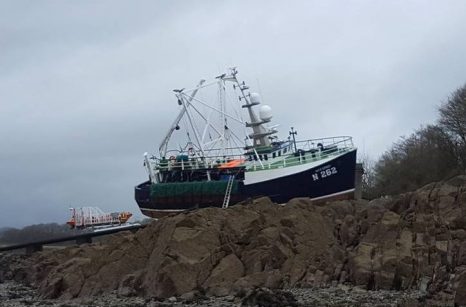
Fishing boat runs aground in Dumfries and Galloway
Five men had to be rescued after a fishing boat ran aground near Kirkcudbright. The stranded commercial vessel hit land within metres of the town’s lifeboat station during the night. The Irish registered scallop dredger was taking on water after hitting the rocks and had sent a distress signal around 1am. A Marine and Coastguard Agency spokeswoman said: “Just after 1am today (31 March) UK Coastguard received a VHF radio call from a fishing vessel reporting they were taking on water at Kirkcudbright Bay. “The vessel with five persons on board had run aground close to the Kirkcudbright Lifeboat Station and hit rocks before it started taking on water. More images, read the rest here 09:17
PARRI to offer Narcan training for fishermen
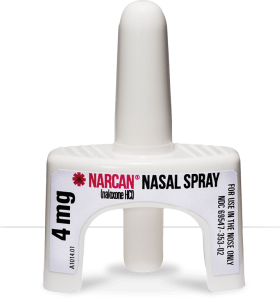 John Rosenthal, Co-founder and Chairman of the Police Assisted Addiction and Recovery Initiative (P.A.A.R.I.), Allie Hunter McDade, Executive Director of P.A.A.R.I., Mayor Sefatia Romeo Theken and Police Chief John McCarthy are pleased to announce that the City of Gloucester, in conjunction with the Fishing Partnership Support Services, Gloucester Fishermen’s Wives Association and the Coast Guard, will offer CPR, first aid and nasal naloxone training to commercial fisherman on Friday, March 31. Approximately 40 fishermen will attending the CPR/first aid course, which will include a segment where they learn how to recognize and respond to an opioid overdose, including how to administer nasal Narcan, which will then become another staple instrument included in their first aid kits. continue reading the story here 08:38
John Rosenthal, Co-founder and Chairman of the Police Assisted Addiction and Recovery Initiative (P.A.A.R.I.), Allie Hunter McDade, Executive Director of P.A.A.R.I., Mayor Sefatia Romeo Theken and Police Chief John McCarthy are pleased to announce that the City of Gloucester, in conjunction with the Fishing Partnership Support Services, Gloucester Fishermen’s Wives Association and the Coast Guard, will offer CPR, first aid and nasal naloxone training to commercial fisherman on Friday, March 31. Approximately 40 fishermen will attending the CPR/first aid course, which will include a segment where they learn how to recognize and respond to an opioid overdose, including how to administer nasal Narcan, which will then become another staple instrument included in their first aid kits. continue reading the story here 08:38
Carlos Rafael’s guilty plea in federal court draws mixed reactions
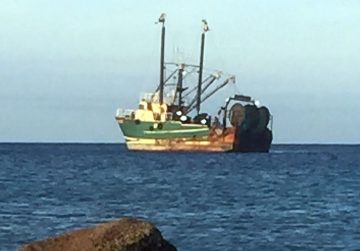 There was a mixture of emotions and reactions among members of the local fishing industry over the guilty plea Carlos that “The Codfather” Rafael entered in Federal Court Thursday. Some expressed a certain amount of sympathy for Rafael in the highly regulated business. Some didn’t. This doesn’t come as a surprise,” said Mayor Jon Mitchell. Ever since Carlos’ arrest became public it was clear the government had him dead to rights.” “The more important question is what will happen to the permits. That determination has been left up to NOAA. Jim Kendall, president of New Bedford Seafood Consulting, had the same concern about the permits. He noted that other boat owners have been stripped of their permits. “But I am not sure that it means anything for us,” he said. Read the story here 18:18
There was a mixture of emotions and reactions among members of the local fishing industry over the guilty plea Carlos that “The Codfather” Rafael entered in Federal Court Thursday. Some expressed a certain amount of sympathy for Rafael in the highly regulated business. Some didn’t. This doesn’t come as a surprise,” said Mayor Jon Mitchell. Ever since Carlos’ arrest became public it was clear the government had him dead to rights.” “The more important question is what will happen to the permits. That determination has been left up to NOAA. Jim Kendall, president of New Bedford Seafood Consulting, had the same concern about the permits. He noted that other boat owners have been stripped of their permits. “But I am not sure that it means anything for us,” he said. Read the story here 18:18
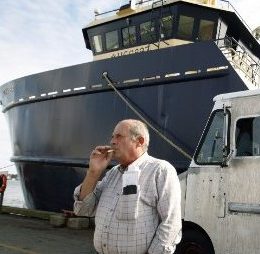
Fishing mogul Carlos Rafael pleads guilty, will be sentenced in June
Carlos Rafael pleaded guilty to charges of falsifying fish quotas, tax evasion and conspiracy in U.S. District Court in Boston Thursday. The U.S. attorney recommended 46 months of prison time for the sentencing hearing, which is scheduled for June 27. Rafael’s attorney William Kettlewell declined comment. He said his office would send out a statement. An updated indictment released two weeks ago included the charge of tax evasion. It stated from November 2014 to about October of 2015, Rafael failed to pay taxes in the sum of $108,929. It also included two new paragraphs regarding the general allegations toward Rafael. Read the rest here 17:02
An in-depth article – Owner of Carlos Seafood pleads guilt to forging records, smuggling profits Click here to read the article 17:36
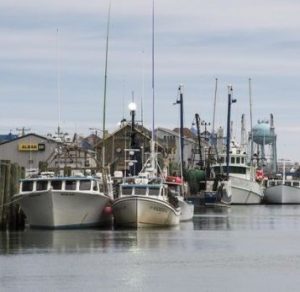
Ocean City Inlet shoaling problem continues
Problems with sand plugging up the Ocean City Inlet have persisted for decades. “There’s billions of dollars (of state revenue) here,” said fisherman Mike Coppa, owner and operator of a West Ocean City trawling operation. “This is a huge problem. It’s the biggest problem we have.” Local commercial fishermen were the guests at an open forum hosted by the Maryland Department of Natural Resources at the Ocean City Marlin Club on Monday, March 27. The semi-annual gathering is held to discuss fisheries issues affecting local operations. Among the topics tossed around the room were several new draft regulations that may affect the take of specific species, the squeeze felt by local fishermen as restrictions are enacted to prevent overfishing in New England, pressures to maintain product quotas to retain valuable fishing permits and methods to attract new fishermen to the local commercial fishing district. continue reading the story here 16:14
For Immediate Release – Statement by Carlos Rafael
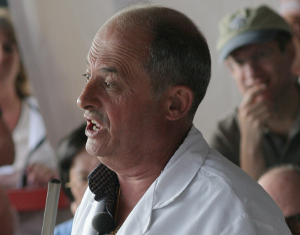 “There have been a number of stories written about this case and about me. Some of the things that have been written are true, some are not. Here is the truth. Today I pled guilty to the charges facing me. I am not proud of the things I did that brought me here, but admitting them is the right thing to do, and I am prepared to accept the consequences of my actions.
“There have been a number of stories written about this case and about me. Some of the things that have been written are true, some are not. Here is the truth. Today I pled guilty to the charges facing me. I am not proud of the things I did that brought me here, but admitting them is the right thing to do, and I am prepared to accept the consequences of my actions.
I started in this industry cutting fish when I was 16 years old, and it has been an honor to work with the people of the Port of New Bedford. Looking back, I’m most proud of the hundreds of jobs our businesses created, and the opportunities they created for families. Today, I have a single goal. To protect our employees and all of the people and businesses who rely on our companies from the consequences of my actions. I will do everything I can to make sure that the Port of New Bedford remains America’s leading fishing port.” Press release from Collara LLP 14:47
North Pacific Fishery Management Council forced back into Cook Inlet salmon fray
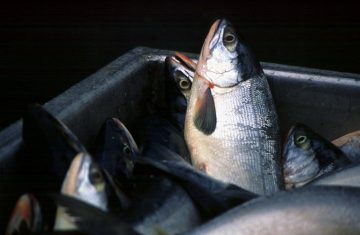 The North Pacific Fishery Management Council will open up a process next week that will likely take years to redesign the Cook Inlet salmon fishery management plan. A federal appeals court decided last fall that the council, which oversees all federal fisheries management in the North Pacific between 3 and 200 nautical miles offshore — known as the United States Exclusive Economic Zone — has to craft a management plan for the salmon fishery. The council decided in 2011 to hand over several of Alaska’s salmon fisheries to state managers by removing them from the existing fishery management plan, and though an Alaska U.S. District judge ruled that it was legal in 2014, a three-judge panel of the 9th Circuit Court of Appeals unanimously reversed the decision this past September. The North Pacific Fishery Management Council is tentatively scheduled to hear the first discussion paper prepared by the National Marine Fisheries Service on what the plan could look like and how they should proceed during the council’s meeting April 6 in Anchorage. How did we get here? continue reading the story here 12:01
The North Pacific Fishery Management Council will open up a process next week that will likely take years to redesign the Cook Inlet salmon fishery management plan. A federal appeals court decided last fall that the council, which oversees all federal fisheries management in the North Pacific between 3 and 200 nautical miles offshore — known as the United States Exclusive Economic Zone — has to craft a management plan for the salmon fishery. The council decided in 2011 to hand over several of Alaska’s salmon fisheries to state managers by removing them from the existing fishery management plan, and though an Alaska U.S. District judge ruled that it was legal in 2014, a three-judge panel of the 9th Circuit Court of Appeals unanimously reversed the decision this past September. The North Pacific Fishery Management Council is tentatively scheduled to hear the first discussion paper prepared by the National Marine Fisheries Service on what the plan could look like and how they should proceed during the council’s meeting April 6 in Anchorage. How did we get here? continue reading the story here 12:01
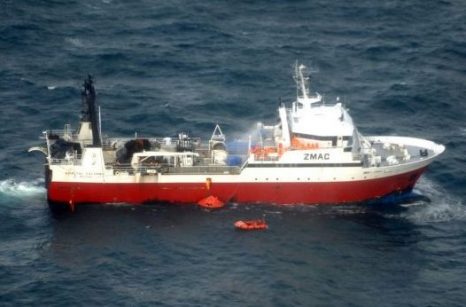
Four-year investigation fails to find cause of ship fire off Canterbury coast
A four year inquiry into a fire that ripped through a ship off the Canterbury coast, forcing dozens of crew members into lifeboats, has failed to establish “with any certainty” how it started. On Thursday, the Transport Accident Investigation Commission (TAIC) released a report into the blaze, which turned the fishing factory freezer trawler Amaltal Columbia into “a fireball from the bow to the stern” in 2012. The 41 crew on board were ordered to abandon ship, 85 kilometres northeast of the Lyttelton heads, after exhausting their air tanks battling the inferno. The fire broke out about 5am on September 12, 2012, in the fishmeal bagging room on the fish processing deck. continue reading the story here 11:25
Commercial Fisherman Releases 30 Tonnes Of Mackerel To Save Dolphins Trapped In Nets
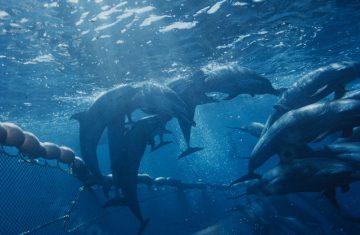 “The crew were determined not to hurt the dolphins in any way if at all possible and they set about trying to free them by lowering the sides of the net,” said Fiona MacMillan, general manager of fishing company Sanford Ltd. “Unfortunately this did not encourage the dolphins to swim out, so the skipper faced a tough choice at that point. “He either took further steps to try and free the dolphins and risk losing the catch of 30 tonnes of jack mackerel, or he faced the prospect of killing the dolphins. “He believed that his first priority was to try to save the dolphins, so he made the decision to release one at end of the net near the bow and that enabled all the dolphins to swim away, totally unharmed. In the process all the jack mackerel accidentally escaped too.” While 30 tonnes of fish is a potentially significant financial loss, Fiona said Sanford’s focus was on sustainability. link 10:45
“The crew were determined not to hurt the dolphins in any way if at all possible and they set about trying to free them by lowering the sides of the net,” said Fiona MacMillan, general manager of fishing company Sanford Ltd. “Unfortunately this did not encourage the dolphins to swim out, so the skipper faced a tough choice at that point. “He either took further steps to try and free the dolphins and risk losing the catch of 30 tonnes of jack mackerel, or he faced the prospect of killing the dolphins. “He believed that his first priority was to try to save the dolphins, so he made the decision to release one at end of the net near the bow and that enabled all the dolphins to swim away, totally unharmed. In the process all the jack mackerel accidentally escaped too.” While 30 tonnes of fish is a potentially significant financial loss, Fiona said Sanford’s focus was on sustainability. link 10:45
Del Norte fishermen and Assemblyman Jim Wood opposes landing fee hike ( from .2¢ to 25¢ per lb.!)
 Del Norte fishermen and Assemblyman Jim Wood are questioning a proposal to increase commercial landing fees as a way of offsetting a $20 million deficit in the California Department of Fish and Wildlife. In his 2017–18 budget summary, Gov. Jerry Brown proposes increasing commercial landing fees statewide by $12.4 million. Brown’s proposal argues that revenue from commercial landing fees support less than one quarter of the Fish and Wildlife’s program costs and have not been adjusted in at least 20 years. But local fishermen and industry representatives say they’re worried that increasing the landing fees will prompt seafood buyers to shift their business to nearby Oregon. continue reading the story here 10:04
Del Norte fishermen and Assemblyman Jim Wood are questioning a proposal to increase commercial landing fees as a way of offsetting a $20 million deficit in the California Department of Fish and Wildlife. In his 2017–18 budget summary, Gov. Jerry Brown proposes increasing commercial landing fees statewide by $12.4 million. Brown’s proposal argues that revenue from commercial landing fees support less than one quarter of the Fish and Wildlife’s program costs and have not been adjusted in at least 20 years. But local fishermen and industry representatives say they’re worried that increasing the landing fees will prompt seafood buyers to shift their business to nearby Oregon. continue reading the story here 10:04
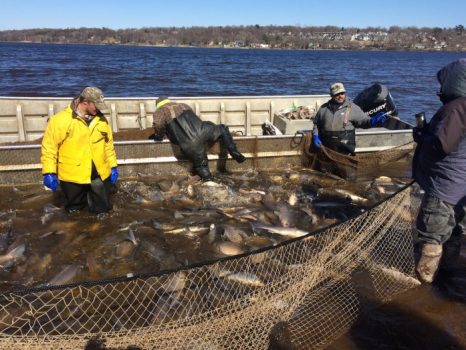
Commercial fishermen catch carp and more in the cold waters at Point Douglas.
It was cold and windy on March 21 when Jim Shiely went down to the beach across from his home in Prescott. Waves washed against the sand. The commercial fishermen were out in their big broad-beamed boats and chest waders, hauling in nets full of rough fish: a writhing mass of suckers, sheepshead, and assorted bottom-feeders. “No paddlefish that I saw,” Jim wrote. “Saw one good sized musky which the MN DNR weighed and measured around 44 inches and one small sturgeon. A lot of quillback, all of which they threw back. Saw a nice number of huge walleyes, which of course are thrown back along with all other game fish.” view the photo gallery, read the rest here 08:38
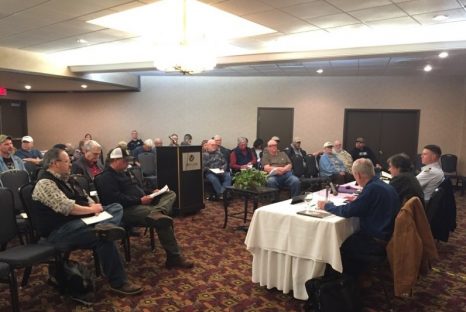
Commercial fishermen on south coast fear salmon season could be cut short
Commercial fishermen on the south coast say they’re worried this year’s fishing season could be cut short or even become obsolete. According to the Pacific Fishery Management Council, salmon numbers are down the past couple of years and this year doesn’t look to be much better. “If the fish don’t show, our season–salmon season–would be over and a lot of guys will make very little money,” said one fisherman of 42 years at a public meeting Monday night. “A lot of markets, restaurants won’t have salmon.” The PFMC took public comment Monday in Coos Bay on proposals for the season and talked about the effect on the salmon fishery. Click here to watch video, read the rest here 17:50
NRDC, CLF, CBD Acts to Defend Atlantic’s First Marine Monument
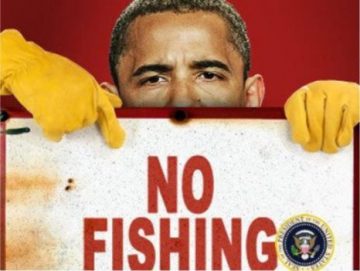 NRDC is seeking to intervene in a lawsuit that challenges the New England marine monument established last September—the first such monument off the continental U.S. Together with other supporters of the Northeast Canyons and Seamounts Marine National Monument, NRDC today filed this motion to intervene in a lawsuit filed earlier this month by five regional commercial fishing associations. This ocean park spans almost 5,000 miles and safeguards ancient coral gardens, endangered sperm whales, Atlantic puffins, and literally thousands of other animal species for the benefit of all Americans. Our goal is to prevent it from being handed back to private industries for commercial exploitation, including commercial fishing, seismic surveying, oil and gas drilling, and mining. We also want to protect the President’s authority to designate future marine monuments and demonstrate that the other four marine monuments–designated by Presidents Obama and George W. Bush—were legally created. Our partners seeking to intervene include a naturalist who leads whale watch tours, Conservation Law Foundation and the Center for Biological Diversity (CBD). Read the rest of this stuff here 17:03
NRDC is seeking to intervene in a lawsuit that challenges the New England marine monument established last September—the first such monument off the continental U.S. Together with other supporters of the Northeast Canyons and Seamounts Marine National Monument, NRDC today filed this motion to intervene in a lawsuit filed earlier this month by five regional commercial fishing associations. This ocean park spans almost 5,000 miles and safeguards ancient coral gardens, endangered sperm whales, Atlantic puffins, and literally thousands of other animal species for the benefit of all Americans. Our goal is to prevent it from being handed back to private industries for commercial exploitation, including commercial fishing, seismic surveying, oil and gas drilling, and mining. We also want to protect the President’s authority to designate future marine monuments and demonstrate that the other four marine monuments–designated by Presidents Obama and George W. Bush—were legally created. Our partners seeking to intervene include a naturalist who leads whale watch tours, Conservation Law Foundation and the Center for Biological Diversity (CBD). Read the rest of this stuff here 17:03
Fishery stakeholders unite to form organization aimed at keeping ocean aquaculture industry, government in check
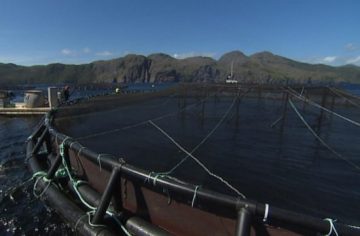 The Newfoundland and Labrador Coalition for Aquaculture Reform (NL-CAR) brings together more than 20 organizations. They include environmental and conservation groups such as the Salmonid Council of Newfoundland and Labrador (SCNL) and the Atlantic Salmon Federation (ASF), First Nations groups like the Qalipu and Glenwood Mi’Kmak, as well as academics, scientists and special advisers. Leo White, vice-president of SCNL and one of the key organizers for NL-CAR, says the group is not anti-aquaculture.,, Among the key issues is that the industry is largely self-regulating and reporting information is voluntary, without any independent oversight.,, NL-CAR is also urging the government to explore more environmentally sustainable alternatives such as land-based farms or closed containment pens in an effort to avoid some of the hazards to the farmed fish and the existing wild fish. Read the article, Click here 16:05
The Newfoundland and Labrador Coalition for Aquaculture Reform (NL-CAR) brings together more than 20 organizations. They include environmental and conservation groups such as the Salmonid Council of Newfoundland and Labrador (SCNL) and the Atlantic Salmon Federation (ASF), First Nations groups like the Qalipu and Glenwood Mi’Kmak, as well as academics, scientists and special advisers. Leo White, vice-president of SCNL and one of the key organizers for NL-CAR, says the group is not anti-aquaculture.,, Among the key issues is that the industry is largely self-regulating and reporting information is voluntary, without any independent oversight.,, NL-CAR is also urging the government to explore more environmentally sustainable alternatives such as land-based farms or closed containment pens in an effort to avoid some of the hazards to the farmed fish and the existing wild fish. Read the article, Click here 16:05
FISH-NL: Labour Board status
 FISH-NL received an update Tuesday afternoon from the Labour Relations Board regarding the status of our certification application. On March 10, the Board ordered the Salt-Water Mafia and the Association of Seafood Producers (ASP) to release their individual lists of commercial fish harvesters to Board investigator, Jody Saunders.. According to Saunders, the FFAW is expected to delivered its list to the Board by this Friday, March 31st. As for ASP, Saunders reported that Derek Butler, the executive director, says he has no authority to order member processing companies to provide the list requested. As well, Saunders said Butler indicated that members of ASP wouldn’t have a complete list of commercial harvesters anyway. continue reading the press release here 15:48
FISH-NL received an update Tuesday afternoon from the Labour Relations Board regarding the status of our certification application. On March 10, the Board ordered the Salt-Water Mafia and the Association of Seafood Producers (ASP) to release their individual lists of commercial fish harvesters to Board investigator, Jody Saunders.. According to Saunders, the FFAW is expected to delivered its list to the Board by this Friday, March 31st. As for ASP, Saunders reported that Derek Butler, the executive director, says he has no authority to order member processing companies to provide the list requested. As well, Saunders said Butler indicated that members of ASP wouldn’t have a complete list of commercial harvesters anyway. continue reading the press release here 15:48
SB-884: Florida lawmakers back bill setting big fines for ‘finning’ sharks
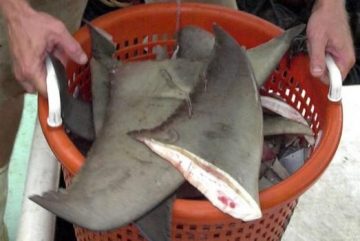 A Florida Senate panel approved legislation Wednesday to levy large fines on commercial fishermen caught carrying illegally harvested shark fins. Federal and state rules already ban finning – cutting off sharks’ fins and leaving the mutilated fish dying at sea. But there’s a legal market for fins, and in 2011 there were 96 tons of fins nationally that were shipped somewhere, either as imports or exports, according to a 2015 federal report. The bill, SB-884, approved by the appropriations subcommittee of the Senate Environment and Natural Resources Committee would require an automatic $5,000 administrative fine and a 180-day suspension of saltwater fishing licenses the first time a commercial shark fisherman is found with a severed fin. The fine would become $10,000 for a second offense and on the third time, the fisherman would be fined $10,000 and have his saltwater licenses permanently revoked. Read the story here, 14:42
A Florida Senate panel approved legislation Wednesday to levy large fines on commercial fishermen caught carrying illegally harvested shark fins. Federal and state rules already ban finning – cutting off sharks’ fins and leaving the mutilated fish dying at sea. But there’s a legal market for fins, and in 2011 there were 96 tons of fins nationally that were shipped somewhere, either as imports or exports, according to a 2015 federal report. The bill, SB-884, approved by the appropriations subcommittee of the Senate Environment and Natural Resources Committee would require an automatic $5,000 administrative fine and a 180-day suspension of saltwater fishing licenses the first time a commercial shark fisherman is found with a severed fin. The fine would become $10,000 for a second offense and on the third time, the fisherman would be fined $10,000 and have his saltwater licenses permanently revoked. Read the story here, 14:42
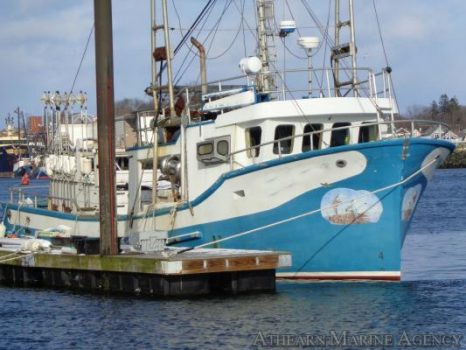
Athearn Marine Agency Boat of the Week: Atkinson & Yates 48′ Gillnetter, 300HP, 6 Cylinder Cummins
Specifications, information and 8 photo’s click here To see all the boats in this series, Click here 12:54
BOEM: Offshore wind farms impact ‘small’ on fishing
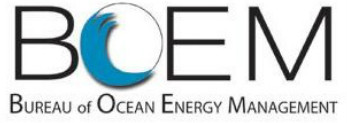 The development of offshore wind farms in the US Atlantic will have a minimal impact on commercial fishing, according to a new report from the Bureau of Ocean Energy Management (BOEM). The BOEM report – ‘Socio-Economic Impact of Outer Continental Shelf Wind Energy Development on Fisheries in the US Atlantic – has been produced in conjunction with the National Marine Fisheries Service to better understand fishing activity in areas of potential offshore wind development. The only impact will be on permitted vessels using pots and gillnets in Rhode Island and southern Massachusetts, which could result in losses of up to $517,000, it found. However, the impacts are not distributed evenly with 20 permits fishing out of Rhode Island ports of Narragansett and Newport and Massachusetts ports of New Bedford and Fairhaven affected the most. link 11:53
The development of offshore wind farms in the US Atlantic will have a minimal impact on commercial fishing, according to a new report from the Bureau of Ocean Energy Management (BOEM). The BOEM report – ‘Socio-Economic Impact of Outer Continental Shelf Wind Energy Development on Fisheries in the US Atlantic – has been produced in conjunction with the National Marine Fisheries Service to better understand fishing activity in areas of potential offshore wind development. The only impact will be on permitted vessels using pots and gillnets in Rhode Island and southern Massachusetts, which could result in losses of up to $517,000, it found. However, the impacts are not distributed evenly with 20 permits fishing out of Rhode Island ports of Narragansett and Newport and Massachusetts ports of New Bedford and Fairhaven affected the most. link 11:53
Marine Patrol officers Corrie Roberts, Matt Talbot recognized for heroic acts boarding lobster boat ‘Legacy’
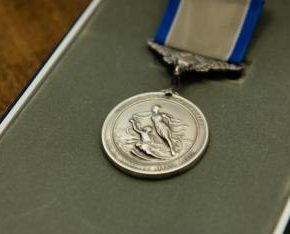 Maine Gov. Paul R. LePage and Rear Adm. Steven D. Poulin, Commander of the First Coast Guard District, presented the Silver Lifesaving Medal and Certificate of Valor to two Maine Marine Patrol Officers at the State House today in Augusta. LePage and Poulin awarded Specialist Corrie Roberts the Silver Lifesaving Medal and Sgt. Matt Talbot the Certificate of Valor for their heroic actions in October 2015, when they received notification that the fishing vessel Legacy, a 40-foot lobster boat, was operating off Rockland in Penobscot Bay in an uncontrolled manner dangerously close to the rocky shore and local maritime traffic. continue reading the story here 11:11
Maine Gov. Paul R. LePage and Rear Adm. Steven D. Poulin, Commander of the First Coast Guard District, presented the Silver Lifesaving Medal and Certificate of Valor to two Maine Marine Patrol Officers at the State House today in Augusta. LePage and Poulin awarded Specialist Corrie Roberts the Silver Lifesaving Medal and Sgt. Matt Talbot the Certificate of Valor for their heroic actions in October 2015, when they received notification that the fishing vessel Legacy, a 40-foot lobster boat, was operating off Rockland in Penobscot Bay in an uncontrolled manner dangerously close to the rocky shore and local maritime traffic. continue reading the story here 11:11






